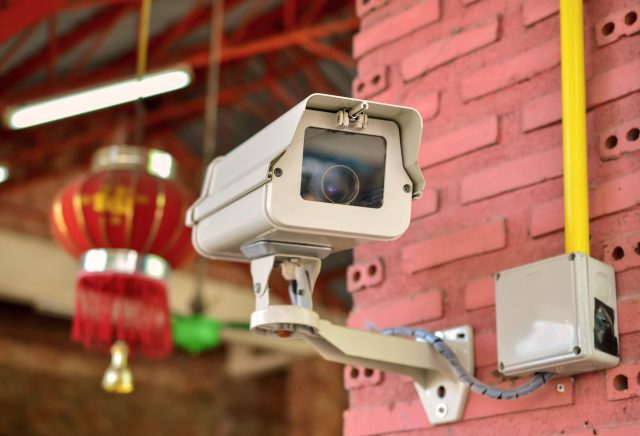Security CCTV camera and urban video.

The Cambridge Analytica scandal (three-scandals-in-one according to Nigel Cameron) rumbles on with as yet unfathomed consequences for Facebook.
However, while I am concerned about the uses and abuses of ‘surveillance capitalism’, we also need some perspective.
In the Big Brother Bake Off contest, the West is very much a runner up to the Chinese state.

Writing for the Atlantic, Rene Chun provides an update on the use of big tech to control the world’s most populous nation. For instance you may have heard about the use of facial recognition in public conveniences:
“Dystopia starts with 23.6 inches of toilet paper. That’s how much the dispensers at the entrance of the public restrooms at Beijing’s Temple of Heaven dole out in a program involving facial-recognition scanners—part of the president’s ‘Toilet Revolution,’ which seeks to modernize public toilets. Want more? Forget it. If you go back to the scanner before nine minutes are up, it will recognize you and issue this terse refusal: ‘Please try again later.’”
“To each according to his need” – Lenin would be proud.
You may also have heard about the use of facial recognition with public display screens to shame jaywalkers:
“Don’t even think about jaywalking in Jinan, the capital of Shandong province. Last year, traffic-management authorities there started using facial recognition to crack down. When a camera mounted above one of 50 of the city’s busiest intersections detects a jaywalker, it snaps several photos and records a video of the violation. The photos appear on an overhead screen so the offender can see that he or she has been busted…”
But that’s just stage one in the shaming process:
“The photos… are cross-checked with the images in a regional police database. Within 20 minutes, snippets of the perp’s ID number and home address are displayed on the crosswalk screen.”
These examples may be more Kafkaesque than Orwellian in their absurdity – but the thing is that they work. Chun provides no statistics on toilet paper consumption in Beijing, but jaywalking in Jinan is down by a whopping 90%.
Perhaps the most insidious aspect of China’s deployment of surveillance tech is that it aims to please:
“Many exist somewhere in the range between helpful and unsettling: A ‘smart boarding system’ from the tech giant Baidu reduces airport check-in to a one-second face scan; at KFC China’s ‘smart restaurant’ in Beijing, customers stand in front of a screen, have their face scanned… and receive menu suggestions based on their age, sex, and facial expression… A female-only university dormitory has even employed facial recognition to keep non-residents out.”
This seems entirely befitting the country’s hybrid communist-capitalist system – all very big brother, but with great customer service.
“The capitalists will sell us the rope we will hang them with” was another one of Lenin’s zippy one-liners. However, what I fear is that China will sell us the rope we hang ourselves with.
Rene Chun observes that China has built the world’s “most advanced surveillance state.” My prediction is that, bit-by-bit, they will export it to the West as state-of-the-art people-management systems. What’s more the demand will come from the people themselves.
For instance, compared to the current airport obstacle course who wouldn’t want to have a one-second face scan instead?
And those name-and-shame camera systems – I could think of a few uses for those. We already have speed cameras on our roads, but what if they could also catch persistent tailgaters or the jerks who throw litter out of car windows. There’s plenty of people who would vote for that sort of thing.
For all the concern about what tech industries are doing behind our backs, the real threat to freedom will come from what they dangle before our eyes.










Join the discussion
Join like minded readers that support our journalism by becoming a paid subscriber
To join the discussion in the comments, become a paid subscriber.
Join like minded readers that support our journalism, read unlimited articles and enjoy other subscriber-only benefits.
Subscribe